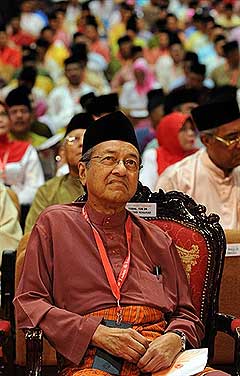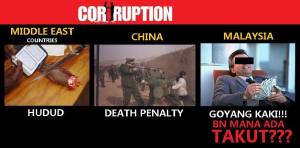Mahathirism: A Continuing Burden Upon The Nation
6
August 26, 2013
Mahathirism: A Continuing Burden Upon The Nation
by Dr. M. Bakri Musa
Morgan-Hill, California
Morgan-Hill, California
“…the man has burdened (and continues to burden) Malaysia with many more ugly legacies… Most of all he has devalued the trust we have in each other, a vital but scarce asset in a plural society.”–Bakri Musa.
Mahathir is the only Prime Minister who devalued the ringgit, the very symbol of the nation’s sovereignty. If that were to be his only negative legacy, Malaysia could easily bear it. Unfortunately the man has burdened (and continues to burden) Malaysia with many more ugly legacies. He has also devalued our culture and institutions. Most of all he has devalued the trust we have in each other, a vital but scarce asset in a plural society.
On a much lesser scale, and to serve more as a concrete example, the upcoming UMNO leadership convention will be another. With its “no contest” rule now the norm, the convention mocks the very meaning of a leadership election, reducing it to the same level as the old Soviet “elections.” This coming event will again expose the party’s corruptness and how pathetically bereft it is of talent. The same old tired and tainted candidates will be recycled. It is an exercise less of renewal and rejuvenation, more of an old and leaking sewer treatment plant, with nothing to hide the stench.
As for the candidates, they would be like desperate monkeys elbowing and clawing each other for the top branches, their howling effectively drowning out the sound of the tree crashing down.
UMNO Baru has Mahathir’s Ugly Trademarks
Legally speaking, this party is of course not the original UMNO, rather “UMNO Baru,” Mahathir’s own creation after he maneuvered a less-than-honest squeaky victory over his challenger, Tengku Razaleigh, back in 1987. The party was subsequently deregistered. UMNO Baru is but a pretender to that glorious old party, the spirit of 1946, the one that bravely fought against the Malayan Union and ultimately brought the country to independence. No surprise then that this UMNO Baru has all of Mahathir’s ugly trademarks.
I am privileged not to have met the man; thus my analysis is strictly based on his policies and performances as a leader. It is not colored by personal feelings or show of gratitude. I am spared the “mudah lupa” (ingrate) epithet.
 Again thanks to Mahathir, this mudah lupa is a special burden in our culture where one’s personal kindness and familiarity could hide and indeed excuse many a sin. Mahathir himself is not spared this burden; hence his being easily hoodwinked by the put-on piety and humility of his chosen successor, Abdullah Badawi. Even Mahathir’s subsequent enthusiasm for Najib to replace Abdullah was based less on Najib’s talent, more an expression of Mahathir’s gratitude to Najib’s late father for having “rehabilitated” Mahathir into UMNO.
Again thanks to Mahathir, this mudah lupa is a special burden in our culture where one’s personal kindness and familiarity could hide and indeed excuse many a sin. Mahathir himself is not spared this burden; hence his being easily hoodwinked by the put-on piety and humility of his chosen successor, Abdullah Badawi. Even Mahathir’s subsequent enthusiasm for Najib to replace Abdullah was based less on Najib’s talent, more an expression of Mahathir’s gratitude to Najib’s late father for having “rehabilitated” Mahathir into UMNO.
Yes, Mahathir was once kicked out of that grand old party back in 1970 in the aftermath of the deadly 1969 race riots. Those early leaders of the original UMNO were wise and prescient.
Rehabilitated he was, and with his subsequent ascent to the top post, the country now bears the burden of his follies and corrupt ways. We will continue to do so long after he is gone, such was the damage he inflicted upon the country’s soul.
The currency devaluation was painful enough, especially to the poor. We still bear it today. Judging by past performances, this upcoming leadership contest would again assault our sensibilities, especially of Malay culture. Forget about our budi bahasa(gracious) and halus (soft) ways.
Those previously found guilty of “money politics” (that’s corruption, to the rest of  us) like Isa Samad and Khairy Jamaludin would again be elected to top positions. So too would former Selangor Chief Minister Khir Toyo, except that he is now serving time for corruption. Incidentally Khir Toyo is regarded as “clean” by his fellow UMNO members. As for Isa and Khairy, the former is now put in charge of the multi-billion ringgit FELDA, the latter, a cabinet minister. That too, is part of Mahathir’s legacy.
us) like Isa Samad and Khairy Jamaludin would again be elected to top positions. So too would former Selangor Chief Minister Khir Toyo, except that he is now serving time for corruption. Incidentally Khir Toyo is regarded as “clean” by his fellow UMNO members. As for Isa and Khairy, the former is now put in charge of the multi-billion ringgit FELDA, the latter, a cabinet minister. That too, is part of Mahathir’s legacy.
 us) like Isa Samad and Khairy Jamaludin would again be elected to top positions. So too would former Selangor Chief Minister Khir Toyo, except that he is now serving time for corruption. Incidentally Khir Toyo is regarded as “clean” by his fellow UMNO members. As for Isa and Khairy, the former is now put in charge of the multi-billion ringgit FELDA, the latter, a cabinet minister. That too, is part of Mahathir’s legacy.
us) like Isa Samad and Khairy Jamaludin would again be elected to top positions. So too would former Selangor Chief Minister Khir Toyo, except that he is now serving time for corruption. Incidentally Khir Toyo is regarded as “clean” by his fellow UMNO members. As for Isa and Khairy, the former is now put in charge of the multi-billion ringgit FELDA, the latter, a cabinet minister. That too, is part of Mahathir’s legacy.
One might quibble about Khairy for he once bragged about being Mahathir’s vocal critic. However, Mahathir’s legacy is the overall negative culture he fostered in UMNO Baru. In any other culture or jurisdiction, that young man would not even be nominated for dog catcher. That speaks volumes to the degradation of UMNO Baru. That is Mahathir’s legacy, its destructiveness is pervasive and permanent precisely because it is less obvious.
Mahathir’s scathing and relentless criticism of his successor, Abdullah Badawi, cannot hide the obvious fact that he (Mahathir) was responsible for the mess. He appointed Abdullah. Similarly, Mahathir was highly instrumental in Najib replacing Abdullah. Mahathir’s excuse of there being no one else is just that – an excuse. Two successive dud appointments to the highest office of the land, another of Mahathir’s ugly legacies!
Mahathir never tires of reminding us about Petronas Twin Towers, the gleaming highways, and the KLIA, all built during his administration. He also used to brag about Putrajaya, the multibillion-dollar new capital city. Not anymore. Yes, Putrajaya sports some futuristic bridges but it must be the only capital in the world that does not have any foreign embassies. As for those bridges, they must be the only ones to be erected where first they had to dig a lake so they could be water underneath those bridges!
It is pathetic that after having served as the nation’s longest serving chief executive, Mahathir could point only to those physical monuments as his legacy. We have to constantly remind ourselves that the deterioration of our institutions (especially our schools, civil service, and universities), the pervasiveness of corruption, the soiling of our culture (especially Malay culture), and the erosion of the trust we have in each other are the very core of his legacy.
It took the Soviets generations to free themselves of the grip of Stalin’s ghost. It took the Chinese decades to recognize and then overcome Mao’s malignant feng shui. How long will Malaysians, Malays specifically, take to escape the hantu (ghost) of Mahathirism? Will we ever?
 Malaysian-born Dr. M. Bakri Musa, a California surgeon, writes frequently on issues affecting his native land. His credits, apart from scientific articles in professional journals, have appeared in Far Eastern Economic Review, International Herald Tribune, Education Quarterly, and New Straits Times. His commentary has also aired on National Public Radio’s Marketplace.
Malaysian-born Dr. M. Bakri Musa, a California surgeon, writes frequently on issues affecting his native land. His credits, apart from scientific articles in professional journals, have appeared in Far Eastern Economic Review, International Herald Tribune, Education Quarterly, and New Straits Times. His commentary has also aired on National Public Radio’s Marketplace.
He is the author of The Malay Dilemma Revisited: Race Dynamics in Modern Malaysia, Malaysia in the Era of Globalization,and An Education System Worthy of Malaysia and Towards A Competitive Malaysia. His latest book, Liberating the Malay Mind, is a bestseller.

